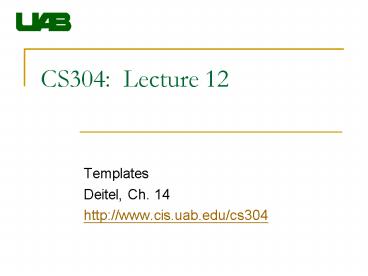CS304: Lecture 12 - PowerPoint PPT Presentation
1 / 18
Title:
CS304: Lecture 12
Description:
Templates are C 's method of allowing generic ... Imagine writing just one sort that will accept an arbitrary ... ( Practical application: Summing an array ... – PowerPoint PPT presentation
Number of Views:42
Avg rating:3.0/5.0
Title: CS304: Lecture 12
1
CS304 Lecture 12
- Templates
- Deitel, Ch. 14
- http//www.cis.uab.edu/cs304
2
Generic Programming
- Templates are Cs method of allowing generic
programming. - This is the method of allowing a single code
segment an entire range of overloaded functions,
or an entire range of related classes.
3
Function vs. Class Templates Examples
- Function A sort function! Imagine writing just
one sort that will accept an arbitrary container
type, as well as an arbitrary data type. - Class A stack class. Such a stack could be
instantiated for any type, so it could hold any
data type with one implementation. (How would
this be different from a similar stack in Java?)
4
Function Templates
- When overloading functions, its often
repetitive, resulting in identical (or similar
functions) - Identical implementations can be abstracted to a
template, where the types can be inferred from
calls to the function.
5
Example Add
- Initially, unrelated implementations
- int add(int x, int y) return x y
- unsigned int add (uint x, uint y) return x y
- char add(char x, char y) return x y
- float add(float x, float y) return x y
- double add(double x, double y) return x y
- mytype add(mytype x, mytype y) return x y
6
Problems with Add
- This takes SIX function definitions to do the
same exact things with the six types given - Also, notice If we want to add more user
defined types, we have to add even more!
7
Add An Improvement Through Templates
- Template lt typename Type gt
- Type add(Type x, Type y)
- return x y
- //Note The type template parameter Type is
usually abbreviated as T
8
How Does the Compiler Handle This?
- In this case, there is very little intelligence
behind the actual implemenation of templates.
9
Templates with User Defined Types
- How can we automagically use a user defined type
in the add function? - Well, automagic isnt the way computers work. We
have to overload the operator - This is the second reason that operator
overloading is so important in C! - No overloading results in a program that wont
compile
10
Overloading Function Templates
- What if almost all of the functions we want to
overload are identical, but one or two are quite
different? (Practical application Summing an
array of numbers) - Specifying a non-templatized function will
override the corresponding function created by
the template
11
Class Template
- Lets expand on the idea of a stack template that
can take any type. Here is the usual
declaration
12
- class stack int d int index int
sizestack() d new int10 size 10 index
-1 stack() delete d void push(int
val) - int peek()
- int pop()
13
- template lttypename Tgt class stack T d int
index int sizestack() d new T10 size
10 index -1 stack() delete d void
push(T val) - T peek()
- T pop()
14
Using a Template Class in a Program
- Using a function template is trivial Calling the
function as usual does the trick - Instantiating a templated class is not the same,
because the compiler wont know which type to use
to instantiate. This must be given at
declaration. - int main() Stack ltdoublegt doubleStack
15
Nontype Parameters
- Nontypes can be used with templates in order to
make compile-time information useful in a classs
definition. - Example A stack class that has a statically
allocated block of memory of a specific size, in
order to reduce the cost of dynamic allocation - template lttypename T, int elementsgt
- Stackltdouble, 100gt HundredSlotStack
- Instantiate a 100-element stack
16
Notes on Templates and
- Inheritance
- A class template can be derived from
- a class-template specialization
- a nontemplate class
- A class-template specialization can be derived
from - a class-template specialization ???
- A nontemplate class can be derived from
- a class-template specialization
17
Notes on Templates and
- Friends
- It is possible to use template classes,
class-template specializations, and template
functions as friends - Please see 14.7 in the book for further
information, but it works as you would expect.
18
Notes on Templates and
- Static Members
- Recall that class-template specializations make
copies of the class, and basically substitutes
the typename in for the typename variable used in
the class - This implies that static variables are shared
between all objects of a class-template
specialization, but not all class-template
specializations, i.e., each specialization has
its own copy































